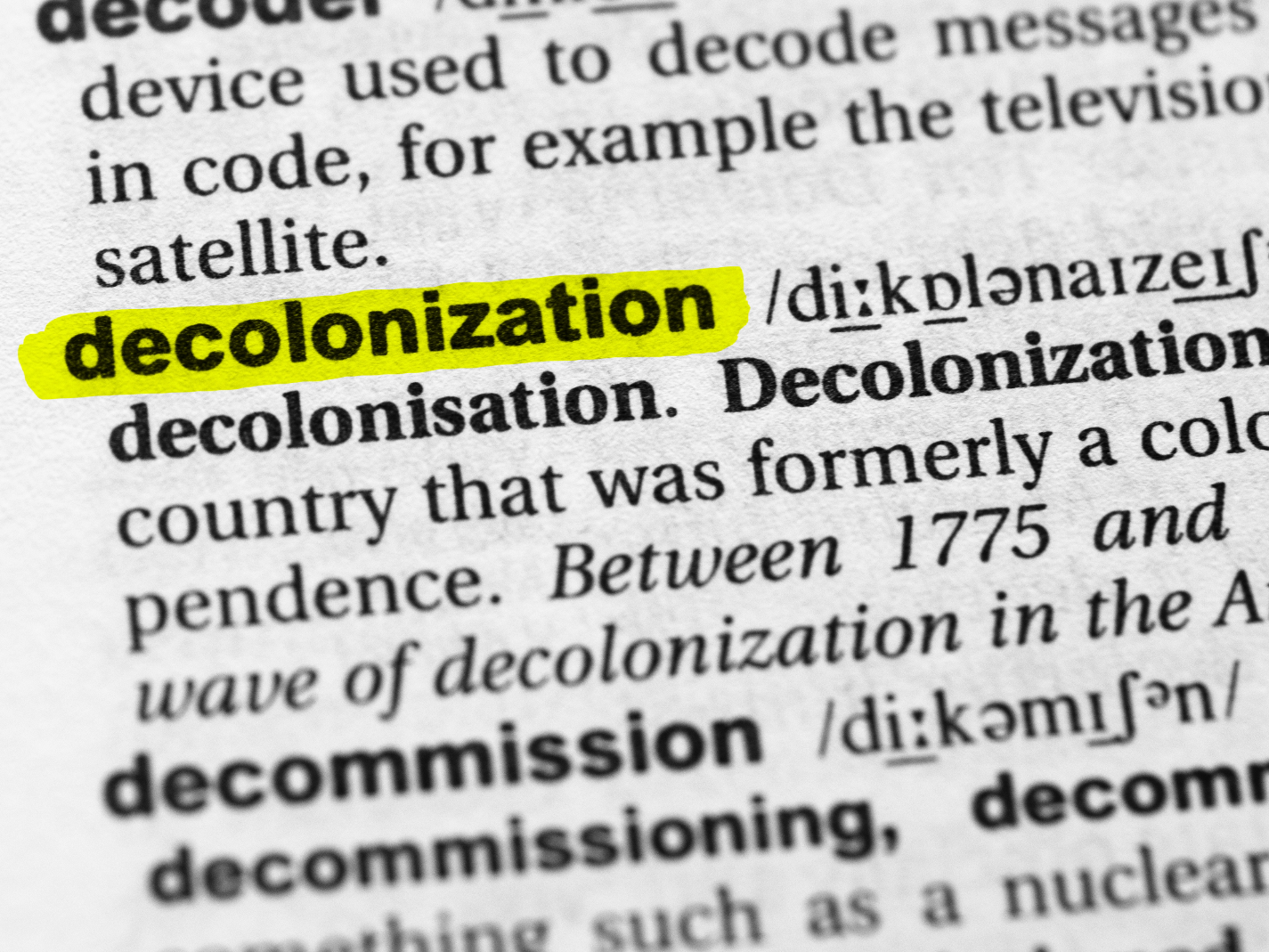
In the midst of the Israel-Hamas conflict, calls for “decolonization” have increased significantly.
In summary, the philosophy and academic topic of “decolonization” is the rejection of nearly any and all holdovers from colonial powers, like the British Empire. Rejection of these “holdovers” can include everything from a rejection of European formal wear in favor of more culture-specific traditional attire to a rejection of the scientific method in favor of “indigenous ways of knowing.”
In the latter lies serious dangers, such as depriving non-European people of the miracles of Western medicine and the advantages of public infrastructure—all in the name of “decolonization.” This concern is not simply an example in the extreme. I personally witnessed such argumentation at Mount Sinai Medical School earlier this year, where a discussion host with Mount Sinai’s Center for Anti-Racism in Practice (CAP) advocated for people to stop traveling to places like Hawaii—despite knowing that a loss of tourism would undoubtedly devastate those economies.
Still, in the midst of mass anti-Semitism and the ongoing promotion of an ideology that hurts those it purports to help, we actually may have some good news: scholarly fascination with “decolonization” as a research topic appears to be on the decline—and a steep decline at that.
I spent the evening of Halloween scraping Google Scholar for “decolonization” related literature, using a dictionary that included terms such as “Christonormativity,” “Eurocentrism,” “Reindiginization,” and more common terms such as “settler-colonialism,” “post-colonialism,” and “whiteness.” This process netted 2,124 distinct academic articles or books within Google Scholar, and repeated samplings of the titles revealed no false positives—at least none immediately obvious.
The trend line of these articles’ publication years tells quite the story: the earliest files originated in the mid-1960s—no surprise there, considering that’s when the radicals began to enter into the universities—with notable rises throughout the 1980s and 1990s. From 2003 onward, there was a rapid rise of decolonization-related literature (possibly in response to America’s global war on terrorism, though this hypothesis remains untested) and that rise continued—albeit much slower, until 2020.
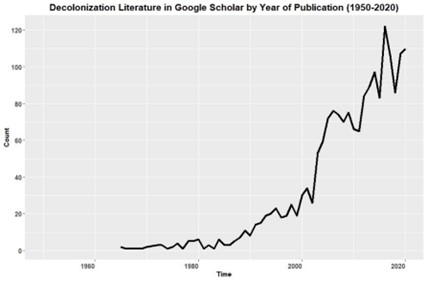
After 2020, however, it appears as though scholarly interest in publishing on “decolonization” began to decline steadily up to the present day.
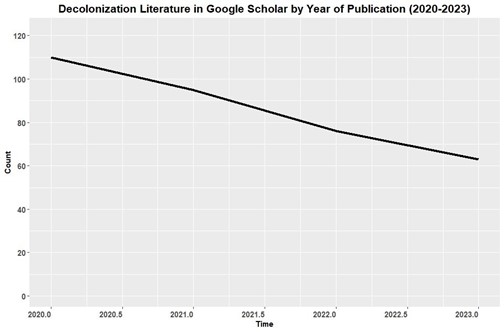
The above image does not do this decline justice, however. If we zoom out to observe the past 20 years (2003-2023), the decline is clearly much steeper post-2020 than the image above would initially lead you to believe. It seems that we have almost returned to 2003 publication rates, as the next graph shows:
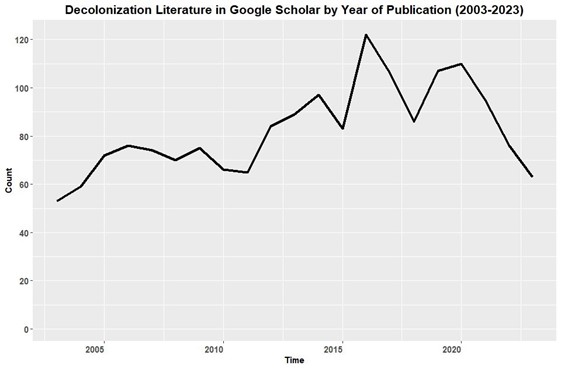
Still, I was concerned that my several small scans on particular keywords pulled too heavily from the post-2000 era, ultimately creating bias in the data set and making it appear as though “decolonization” related literature had increased more rapidly post-2003 than it actually had. To try and falsify my findings, I ran one large scan of Google Scholar with only a single keyword: “decolonization,” and set no time constraints. This process ultimately netted 974 distinct articles—a sample size that is 45% of the original, potentially biased dataset.
The results from that single large scan are quite clear and mostly matched the trend line derived from the several small scans. More importantly, it shows just how dramatic the decline of decolonization-related literature has been since 2020.
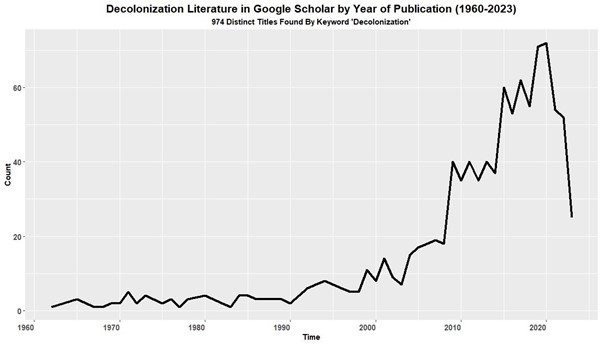
This is seemingly good news, but I am hesitant to say that the tide has truly turned. For example, it is entirely possible that those who were writing about “decolonization” moved on to write about more recent fads such as “racial justice” after the Black Lives Matter riots in 2020, or other topics such as transgenderism, and have simply not yet returned to their old field.
Then again, even if the decline has truly occurred for all the reasons that we hope, it does not mean that this genocidal philosophy of “decolonization” will not continue to be taught through previously published material, nor that it will not continue to infect the minds of students.
This steep decline is an encouraging sign, but know that there is still a war to be won.
Author’s Note: All data and R code used to make the images above are freely available to the public on the association’s GitHub account.
Photo by lobro — Adobe Stock — Asset ID#: 429233349
American lefties are barking up the wrong tree if they demand that Palestine be “decolonized.” Israel is a product of decolonization. That’s no guarantee against racism.
By claiming Israel is a European colonial project, the left can blame whitey, and avoid using the term “Jewish supremacy,” which makes them feel uncomfortable.
The decline is inevitable. Decolonization is a one trick pony—after you have said borders from (largely White) countries should be eliminated, what is there left to say? What I question is whether any of this so-called “scholarly work” ever qualified as legitimate research.
Let’s hope this shows the ongoing collapse of “wokeness.” Personally, I’m horrified by October 7 and the subsequent war, and worldwide eruption of anti-Semitism. I had long thought that Boycott, Divestment, Sanctions (BDS) was a danger, and the whole DEI movement, but I wasn’t prepared for what has happened the last few weeks. I hadn’t seen the connection of DEI with murderous, worldwide anti-Semitism, except in a kind of loose, abstract way. I don’t think the Jew-hatred is all about DEI, but I now think they are more strongly connected than I had thought. DEI has to be rooted out of the K-12 schools. The colleges, especially our corrupt elite Ivy League schools, need to be cleaned out. I hope it doesn’t stop with rich donors bailing. It’s not too strong to say that we need some de-Nazification. The young people in the Western world, and the U.S. in particular, are in terrible shape. They need attention and care in their upbringing.
Jonathan, I am not surprised at all — not at all.
I was dealing with these people 30-40 years ago — they have now progressed to leadership positions and we are now starting to deal with the third generation of what really is Nazi thought. Nazi is not a term I use lightly, but it has a specific reference to a specific thing — the German National Socialist Party and it’s philosophies of group identity, group conformity and yes, racial purity.
We can argue if Judaism is a race, but if it is considered one, it’s not much of a leap to then presume that Islam is one. And if you presume that concept (that Islam is a race) and consider it a positive rather than a negative, doesn’t it explain an awful lot of this stuff?
I know a LTC who, when serving in Iraq, rounded up all the plastic pipe he could find and installed a primitive sewerage system of sorts, piping directly into the river. That was a LOT better than having children playing in fields of sewerage, which is what they had.
We stopped having this problem — and the related Cholera outbreaks, etc — in the 19th Century (and stopped dumping raw sewerage in our rivers 50 years ago). But our culture is inferior….